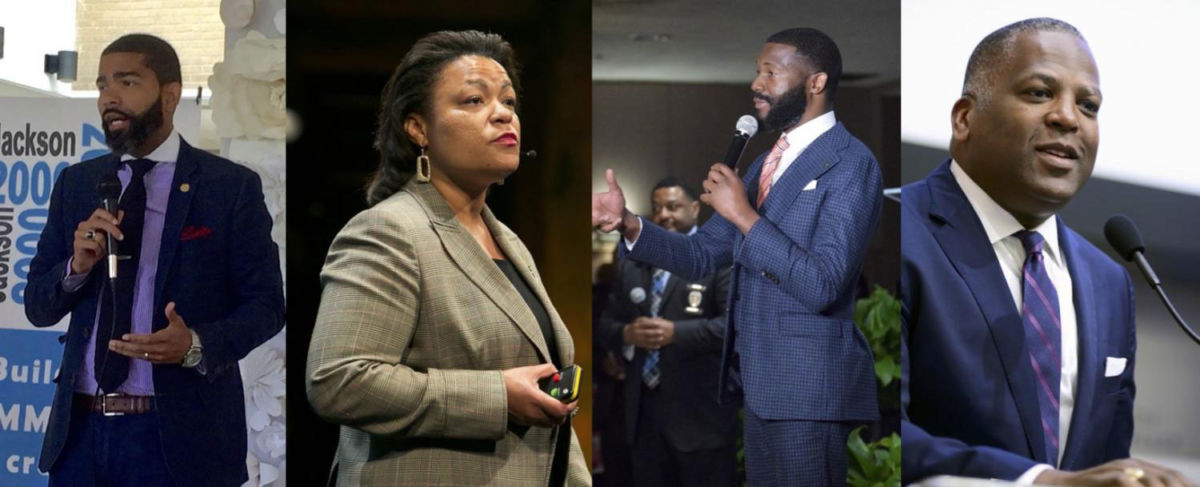Some of the South’s most prominent Black mayors, in four states with the earliest and most competitive primaries, are telling presidential candidates seeking endorsements that they’ll first have to show how they plan to invest in their communities.
The mayors of Birmingham, Alabama; Columbia, South Carolina; Jackson, Mississippi; and New Orleans have released “A Roadmap to Winning the South,” a detailed list of policies that they say are needed for their communities to thrive. And presidential candidates will have to embrace them if they want the mayors’ help in winning over their cities’ combined 1.7 million residents, including more than 345,000 Democratic voters, and the 196 Democratic delegates from the states the cities serve.
“The Democratic nomination runs through our communities,” the mayors write. “And given the power that we wield in this primary process, we fully intend to use our influence and elevate the interests of our residents to ensure that your campaigns deliver a value proposition consistent with their distinct needs.”
Each mayor behind the roadmap is a trailblazer in their own right. Attorney Steve Benjamin is Columbia’s first Black mayor and currently serves as president of the U.S. Conference of Mayors. Longtime neighborhood activist LaToya Cantrell is the first Black woman mayor of New Orleans, elected in 2017 after serving six years on city council. Jackson Mayor Chokwe Antar Lumumba — the lawyer son of former Jackson mayor and longtime human rights champion Chokwe Lumumba — has been heralded as “the most radical mayor in America” for his promotion of cooperative economics and people-centered development. And Randall Woodfin, former president of his city’s school board, became Birmingham’s youngest mayor with his landslide win over an incumbent in 2017.
Benjamin’s endorsement is among the most sought-after in the Democratic primary field. South Carolina’s Feb. 29 primary is the first in the South and the fourth nationwide, and Benjamin is one of the state’s most influential Democratic politicians. Hillary Clinton considered him as a possible vice presidential running mate in 2016, and that same year he spoke at the Democratic National Convention. His political network is reportedly far-reaching enough to make his the second-most coveted endorsement in the state, behind only longtime U.S. Rep. Jim Clyburn, the House Majority Whip.
The policies the mayors are promoting aim to holistically address the disinvestment and other structural problems major Southern cities have faced for decades. With the region’s Republican-dominated state governments often loathe to invest in Democratic-controlled cities and the social safety net, local governments must increasingly step in to fill the gaps. The mayors are asking candidates to commit to increasing resources on more than a dozen policy fronts.
Their most specific recommendations relate to affordable housing. The mayors want increased funding for five federal programs that address urgent housing needs: McKinney-Vento Homeless Assistance Grants, the primary source of federal funding for fighting homelessness; Section 8 Housing Choice Vouchers, which help low-income families pay for private-market housing; the Low-Income Housing Tax Credit, a tax incentive program HUD calls “the most important resource for creating affordable housing in the United States today”; the National Housing Trust Fund, a federal block grant that creates and funds affordable housing for extremely low-income people; and the Capital Magnet Fund, which directs grants to community development financial institutions and nonprofit housing organizations.
The mayors also want candidates to commit to mandated reporting for Opportunity Zone Funds, a federal tax break program meant to incentivize development in low-income neighborhoods. Recent reporting from the New York Times showed that the tax breaks often go instead to developers pursuing projects in wealthy neighborhoods, such as New Orleans’ already-booming Warehouse District.
In addition, the mayors are asking for commitments to expand investments in infrastructure and disaster resilience, to address the racial wealth and opportunity gap, and to reform the criminal justice system. The roadmap also offers a strong health equity agenda. Besides requesting a plan for comprehensive and affordable health care, the mayors want presidential candidates to commit to funding federal programs that preserve environmental quality, including the Superfund and Brownfields programs that have cleaned up contaminated urban sites. The agenda recognizes how environmental quality is inextricably linked to public health in the South, where there is a long history of environmental racism.
And in the future, the mayors want more direct engagement with Southern mayors and municipal offices when presidential administrations are designing federal programs.
“Our Southern cities represent some of America’s most dynamic local economies,” they write. “Yet, national conversations around urban agendas are far too often centered around larger urban centers located outside of the South.”
Media that fights fascism
Truthout is funded almost entirely by readers — that’s why we can speak truth to power and cut against the mainstream narrative. But independent journalists at Truthout face mounting political repression under Trump.
We rely on your support to survive McCarthyist censorship. Please make a tax-deductible one-time or monthly donation.
